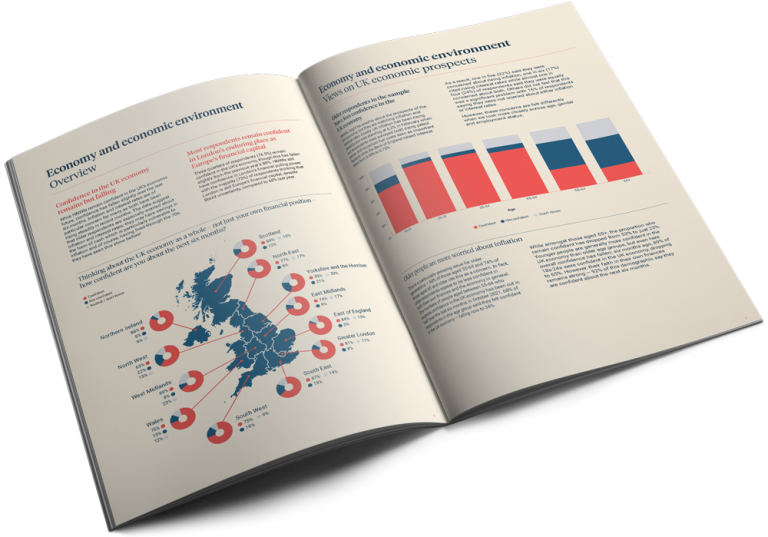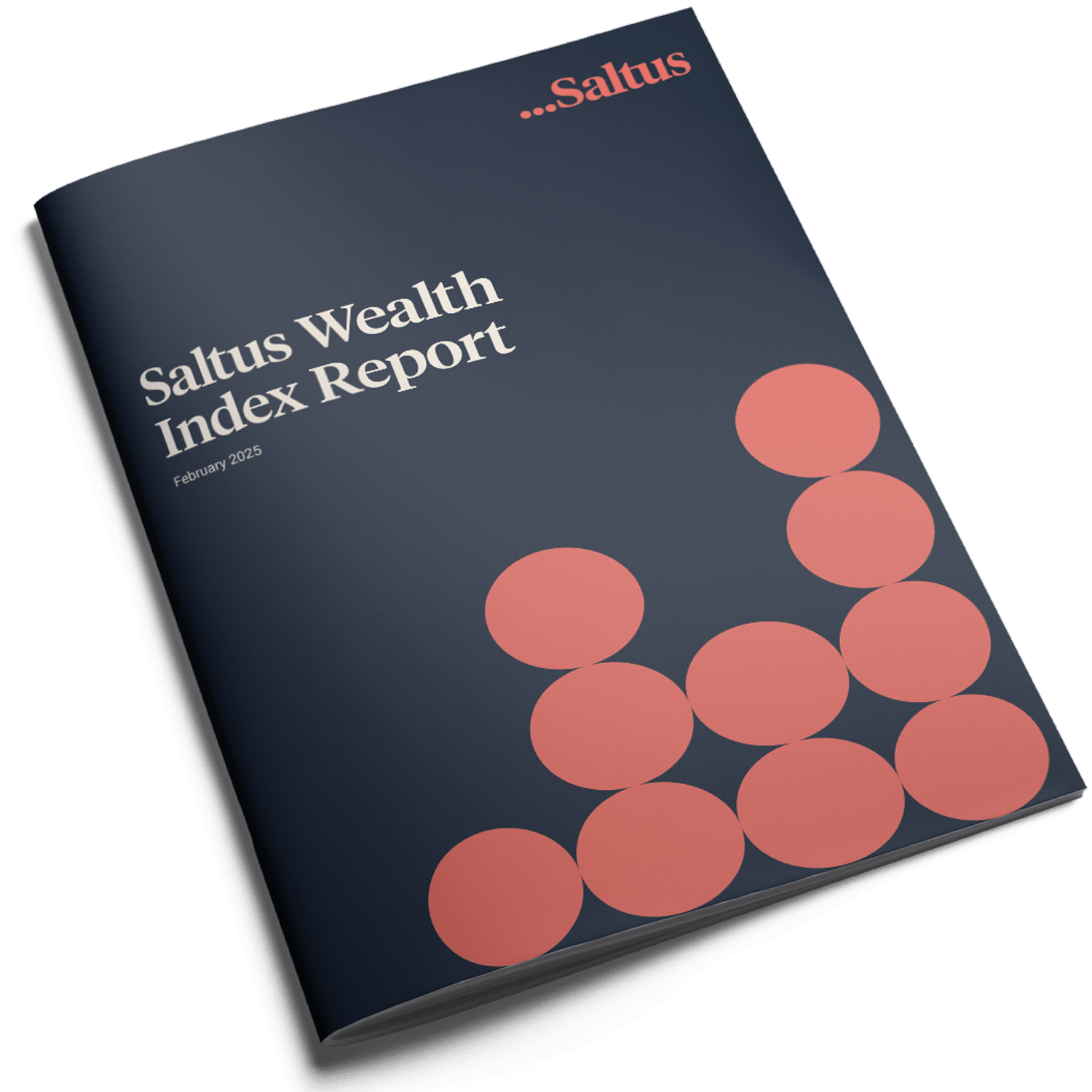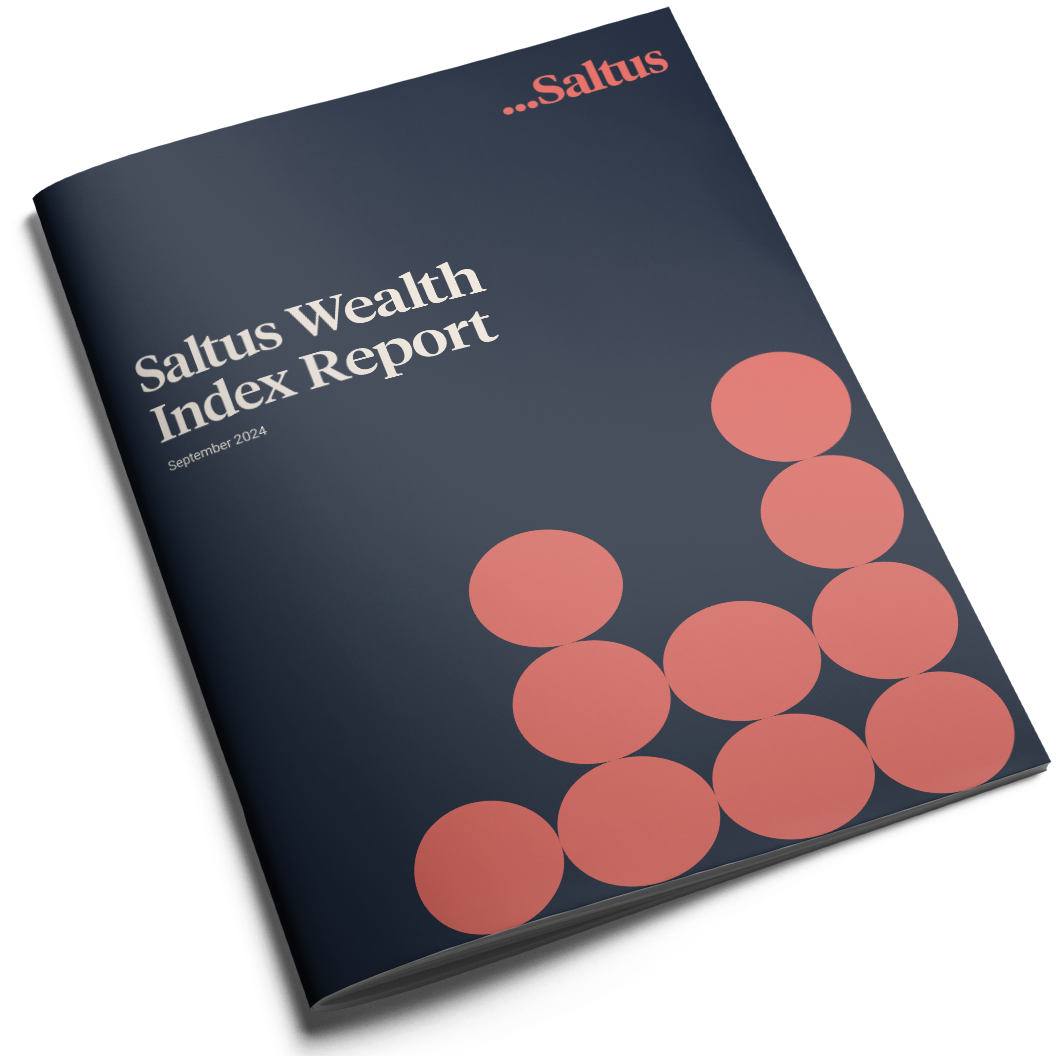Foreword

Twice a year, working with our partners at Censuswide, we canvas a large sample of high-net-worth individuals – a constituency that is vital to the health and future prospects of the United Kingdom. These are the people who will help create wealth and pay taxes that will support the services the country needs so badly, helping fund the UK’s transition to a greener, fairer society. In the last report, we began our collaboration with Dr Mike Peacey, Senior Lecturer in Economics at the University of Bristol. Dr Peacey has consolidated several of the key measures into a single Index, making it easier to see how sentiment has changed among the UK’s wealth creators. Last time round, when the survey commenced, Russia had not invaded Ukraine. The world now feels like a very different place in December 2022, when this latest work was undertaken.
Unsurprisingly, the Index has fallen significantly. Last time it stood at 67.7. Now, it is 59.5.
This headline barometer is the product of a profusion of detail, covering our respondents’ views of the UK economy, their personal finances and other factors which affect their lives. Much of that detail is in this report. However, as the Managing Partner of a wealth management enterprise, it would be remiss of me to fail to point out that confidence levels stand significantly higher among those of our respondents who take financial advice than those who don’t!
If you are interested in finding out more about the report and the data that sits behind it, please visit our website at www.saltus.co.uk/wealth-index.
In the meantime, I hope you find the third Saltus Wealth Index report enjoyable and its findings useful.
Commentary

The Saltus Wealth Index was created to summarise some of the key information gathered from the Saltus questionnaire, and to provide a simple barometer of the subjective confidence and concerns that UK high-net-worth individuals (HNWIs) have relating to the UK economy. The range of the Index is between 0 and 100, with higher values describing higher confidence in, and fewer significant concerns with, the UK economy.
We have undertaken some small methodological changes to the Index and, to allow for comparison, the previous Index (which used data collected in March 2022) has been revised to 67.7 (from 67.9). The current Index (which uses data collected in December 2022) stands at 59.5, which demonstrates that HWNIs’ outlooks have fallen considerably in the last nine months. Every single measure that enters the Index has fallen, although some measures have fallen more than others.
Unsurprisingly, concerns about interest rates and inflation have been the largest driving force. The last nine months have seen inflation hit levels not seen for 40 years, and interest rates not seen since the global financial crisis. Although interest rates do not seem particularly high by historical standards, high levels of debt mean that (in terms of affordability) even modest rises are concerning. This is reflected in the results of the survey – with over 80% feeling that the increasing interest rates would put a strain on their cashflow.
The last nine months have not been without political turmoil, with four chancellors, and several (what have effectively been) budgets. Although, questions have been raised about whether there is adequate Government funding for important public services like social care, the NHS and defense, with disagreements about how tax revenue can be raised. The continued freezes, exacerbated by high inflation, to several important thresholds, such as income and inheritance tax rates and pension contributions, alongside cuts to others, like capital gains tax and dividend allowances, are unlikely to have gone unnoticed by many HNWIs. The data collected in the survey, and used to calculate the Index, highlights these concerns around tax policy, with the proportion of HNWIs who ‘think they pay about the right amount of tax’ falling from 73.1% to 59.6%.
Confidence in the UK economy has also fallen, and there has been a noticeable reduction in the proportion believing that London will remain Europe’s financial capital (down to 61.9% from 72.6%). Surprisingly, there was only a very modest reduction (3%) in the measure that captures individuals’ confidence about their own finances. This suggests that many HNWIs may have processed the challenges that are approaching, perhaps seeking advice, and taking mitigating steps with their investment and financial planning strategies.
Like other segments of society, HNWIs seem to be feeling more pessimistic about the economic situation. Although confidence has fallen markedly, things could be worse. Given the unprecedented events of 2022, this drop in confidence is unsurprising. We will look with interest at how geo-political and economic developments impact this important constituency in 2023.
Executive summary

High-Net-Worth-Individuals’ (HNWIs) confidence in UK economy drops significantly, with confidence amongst older respondents plummeting 43%
Our research shows that rising interest rates, soaring inflation and political and economic uncertainty has taken its toll: HNWIs’ confidence in the UK’s economic prospects has dropped significantly. Nine months ago, 77% of respondents said they had confidence in the UK economy – this has now dropped 10% to 67%. Confidence amongst older respondents has taken the biggest hit, with just 16% of HNWIs over 55 saying they feel confident – down from 29% in the previous Saltus Wealth Index report.
Overall confidence in prospects for personal finances remains, but those who are ‘very confident’ drops sharply, particularly among older respondents
Despite HNWIs’ confidence in the UK economy taking a hit, overall, respondents remain largely positive about their own financial prospects. Eight in ten (81%) say they feel ‘confident’ about their wealth over the next six months, down slightly from 85% in the previous Saltus Wealth Index report, and 30% feel ‘very confident’. Much like with the economy, confidence concerning personal finances also declines with age, with just one in seven (14%) of respondents aged 55 and over feeling ‘very confident’ about their own financial prospects.
Most HNWIs plan to rein in personal spending, while many are providing financial help to their families due to the cost-of-living crisis
Our research shows that the current high interest rate, high inflation environment is having a marked effect on HNWIs’ finances, with more than half (56%) of respondents saying they plan to rein in their personal spending over the next six months. More than eight in ten (84%) of those with a mortgage say rising interest rates will place (39%) or already has placed (45%) a strain on their cash flow.
The data also reveal that rising costs – particularly energy prices – are having an indirect impact on HNWIs, with almost a third (31%) saying that they have started providing financial support to friends and family who are struggling to cover their bills as the cost-of-living crisis continues to bite.
More than a third (34%) of HNWIs say they are helping their children or other dependents to pay for their groceries, 29% are helping with transport costs, two in five (40%) are helping with education costs and 27% with their mortgage.
When it comes to how HNWIs are finding the money to provide this support, 27% say they have reduced pension contributions, while nearly one in four (24%) say they have tapped into housing equity to do so.
Economy & economic environment

Overview
HNWIs’ confidence in the UK economy and London remaining Europe’s financial capital drops significantly
Our research shows that while two thirds (67%) of respondents have confidence in the UK economy, this figure has dropped significantly since the last Wealth Index report, when the figure was almost eight in ten (77%). The data also reveal that this fall in confidence is affecting HNWIs’ faith in the ability of the City of London to remain Europe’s economic hub. Last Spring, almost three quarters of HNWIs (73%) said they thought London would remain Europe’s financial capital in the next decade, but this has now dropped to 62%.
A third of HNWIs are worried about rising inflation
The survey shows that price increases and economic uncertainty are causing concern for HNWIs. One third say they see inflation as the biggest risk to their own wealth – more so than rising energy prices and interest rates – and, when asked whether they are more concerned about the impact of rising inflation or rising interest rates on the UK economy, one in four (24%) said inflation, one in seven (14%) said interest rates, while 16% said both equally. Just 40% were unconcerned about either.
Thinking about the UK economy as a whole – not just your own financial position – how confident are you about the next six months?
- Confident
- Not Confident
- Neutral / I Don't Know
Views on economic prospects
Confidence in UK economy among older HNWIs plummets
Our research shows that HNWIs over 55 are not only significantly less confident in the UK economy than younger respondents, but that their confidence has plummeted since the previous Wealth Index survey.
While three quarters (73%) of respondents aged under 55 say they feel confident – peaking at 78% of those aged 35-44 – this plummets to just 16% for over 55s. This marks a significant drop in confidence compared to our last report, when 28% of over 55s said they felt confident in the UK economy.
Confidence in UK economy by age
HNWIs who receive financial advice are most confident about UK economy and own financial prospects
Those with investable assets of £2m+ are the most confident about the UK economy – 75% say they are confident compared to 59% of those with assets of between £250-500k. Moreover, the data suggest an interesting relationship between confidence and financial advice.
Amongst HNWIs who have never received professional financial advice, just one in four (26%) feel confident about the UK economy compared to eight in ten (81%) of those who have received advice in the last four to six months. When it comes to their own financial situation, 72% of respondents who have never received advice feel confident about the next six months, but this rises to 89% of those who have received advice in the last four to six months.
Confidence in UK economy by net worth of respondent
Confidence in UK economy by when the respondent last received financial advice
Personal finance

Overview
Despite cost-of-living pressures and crypto crash, digital assets remain an area of consideration for HNWIs
According to our research, cost-of-living pressures and the crypto crash don’t seem to have dampened HNWIs’ appetite for digital assets. Half of all respondents (50%) currently hold crypto within their investment portfolio, and more than three quarters (76%) plan to either maintain or increase that investment.
HNWIs are investing for the long term – but enthusiasm for ESG is waning
The research shows that, overall, HNWIs remain confident in their own financial prospects – particularly amongst those who have recently sought financial advice. Most will not change their current portfolio mix in response to the current climate because they are investing for the long-term. However, it seems ESG investments have fallen out of favour, with fewer than half of respondents holding ESG investments, down from 73% in our last report. Most respondents cite a lack of trust in the products rather than a lack of appetite for ESG investment as the reason.
Thinking about your own finances, how confident are you about the next six months?
HNWIs consider cutting pension contributions to finance increases in mortgage expenses
The research shows that the current economic climate – particularly rising interest rates – is impacting the day-to-day finances of our respondents, with 84% saying that their monthly mortgage payments have either already risen to a level that is placing a strain on their cashflow (45%), or they envisage that they will do so (39%).
While 40% of those who are facing higher mortgage payments say they will reduce their personal spending to finance the increased cost, including 32% who will cut down on holidays, more than one in four (28%) say they will have to reduce their pension contributions to meet their increased monthly mortgage costs, rising to 37% for self-employed HNWIs.
Respondents considering cutting pension contributions to finance increasing mortgage rates
The number of HNWIs who think they pay the right amount of tax has declined. The number of respondents who consider they are taxed too heavily has risen sharply
This survey took place after the budget announcements in the Autumn. Our research shows that the majority (60%) of HNWIs think they pay the right amount of tax. However, this has declined from the previous survey in Spring 2022, where 73% of the sample considered they paid the right amount of tax. Indeed, the proportion of respondents who consider they pay too much tax has risen sharply between the reports. Previously this stood at 23% and it now stands at 33%.
Thinking about the amount of tax you pay in the UK, do you think:
A dive into portfolios
Most HNWIs are not worried about their current asset values because they are investing for the long-term
Our research shows that, despite the current economic climate, most HNWIs are not planning to do anything to change their current portfolio mix. Four in ten (41%) say they think they will be better off keeping their asset allocation the same – compared to 34% who think they will be better off changing their portfolio mix. The majority (52%) say they are not worried about their portfolios because they invest for the long-term, and the data suggest that HNWIs are just as likely to make higher risk investments over the next six months as they are to make lower risk investments. 45% of respondents plan to move to increase their holdings of non-sterling assets.
Half of HNWIs hold crypto assets and only 18% plan to decrease their holdings
Despite a market crash and a number of financial scandals within the crypto world, digital assets remain part of the portfolio for some HNWIs. Half of all respondents say they invest in crypto and, of those that do not, 66% say they plan to invest in the future. Furthermore, of those that do hold crypto assets, the vast majority plan to either maintain (40%), or increase (36%) their exposure to the crypto market – just 18% plan to decrease their holdings.
Percentage of respondents who invest in the following asset classes
A mixed picture in ESG
HNWIs’ confidence in ESG products falls
Our research reveals a huge drop in the number of HNWIs that are investing in ESG (Environmental, Social and Governance), as well as a fall in overall confidence about the integrity of ESG products. In our last report, completed before COP27, 73% of HNWIs said they held ESG investments, but this has now fallen to less than half (44%).
Appetite for ESG is there, but trust in the sector is lacking
The data show that appetite for ESG investment remains – of those that currently do not invest in ESG, 87% either plan to or are considering it – but there are significant issues with ESG products among HNWIs.
Of those that currently do not have ESG holdings, 30% say they have not got around to it yet and nearly one in four (23%) say they do not understand the jargon around sustainable investing, but the research also shows declining confidence in ESG products as one in four (25%) say they do not believe ESG is ‘truly’ environmentally friendly – up from 15% in our last survey. 26% of respondents say ESG is just ‘hype’ – up from 20% – and 23% say investing in ESG is ‘greenwashing’, an increase from 15%.
Why do you not invest in ESG/impact/green stocks or funds?
Personal spending
Most HNWIs re-evaluate personal spending as economic reality bites
While HNWIs remain broadly positive about their financial future, they are having to make changes to mitigate the impact of soaring inflation and rising interest rates. Our research shows that more than half (56%) of respondents plan to rein in some of their personal spending over the next six months, due to the current economic climate, while eight in ten (84%) are worried rising interest rates will put a strain on their finances. More than one in five (22%) say they will have to switch their mortgage to interest only to address the hike in their monthly mortgage payments.
Financial advice is more important than ever to HNWIs
The research shows that, as the financial climate gets tougher, more HNWIs are looking to professionals for advice about how to best manage their money. 60% of respondents say they feel they need professional advice more than ever – rising to 71% amongst those who have not received advice in the last 7-11 months. The research also reveals that, in the current climate, 60% of HNWIs want to learn more about how to manage their finances effectively.
Mortgage payments on your home
Rent payments on your home
Pensions
Even HNWIs underestimate how much they need for a comfortable retirement
The last Saltus Wealth Index report uncovered a worrying gap between expectation and reality when it comes to pension savings and retirement income. A mean pot of £539k was considered necessary by respondents to fund a ‘comfortable retirement’. But, if pensioners were to follow the 4% rule*, a pot of this size would only provide an income of around £21,552 a year – not what most would describe as ‘comfortable’, and less than half the £55k per year respondents said a couple would need.
This year, respondents are still underestimating how much they need in their pension pot for a comfortable retirement. On average, HNWIs say they want an individual income of £55k in retirement and believe a pension pot of £578k would achieve this; many experts believe this would require a pension pot of nearer £1.3m.
What size pension pot and annual income do you think you will need for a ‘comfortable retirement’?
| Couple Desired Income | State Pension | Shortfall | Pot Required |
|---|---|---|---|
| £47,000 (PSLA 'comfortable' retirement) | £19,256.00 | £27,744.00 | £693,600.00 |
| £55,246 (Saltus WI ‘comfortable’ retirement) | £19,256.00 | £35,990.00 | £899,750.00 |
| £60,000 | £19,256.00 | £40,744.00 | £1,018,600.00 |
| £80,000 | £19,256.00 | £60,744.00 | £1,518,600.00 |
| £100,000 | £19,256.00 | £80,744.00 | £2,018,600.00 |
| Individual Desired Income | State Pension | Shortfall | Pot Required |
|---|---|---|---|
| £33,000 (PSLA ‘comfortable’ retirement) | £9,628.00 | £23,372.00 | £584,300.00 |
| £40,000.00 | £9,628.00 | £30,372.00 | £759,300.00 |
| £60,000 | £9,628.00 | £50,372.00 | £1,259,300.00 |
| £80,000 | £9,628.00 | £70,372.00 | £1,759,300.00 |
| £100,000 | £9,628.00 | £90,372.00 | £2,259,300.00 |
*The 4% rule was developed by financial planner William Bengen in 1994. Through his research, Bengen found that people could withdraw 4% of their investments in the first year of retirement and then withdraw the same amount, adjusted for inflation, for at least 30 years without exhausting their portfolio. To calculate the retirement savings needed (r) for the income desired (i), the calculation is i / 4% = r
One in three HNWIs have reduced pension contributions or plan to
The survey shows that most HNWIs are underestimating the size pension pot they’ll need for a comfortable retirement, and it also reveals that, despite this potential underfunding, 14% of respondents have reduced their pension contributions in the past six months, while a further 14% plan to reduce them over the next six months.
Housing
Rising mortgage rates are putting a strain on finances – one in four will have to switch to interest only
According to this research, more than eight in ten (84%) HNWIs expect their mortgage rates to rise and say this either will (39%) or already has (45%) put a strain on their cash flow.
To finance these increased payments, four in ten (40%) plan to reduce their personal spending, while a third (32%) will cut down on holidays and travel. However, for many the consequences will be far more impactful. Three in ten (28%) say they will have to reduce their pension contributions to make up the shortfall, one in four (25%) say they will have to sell other assets, while 22% say they would switch to an interest only mortgage. However, just 3% would have to downsize.
Residential assets are a key part of retirement funding for HNWIs
On average, eight in 10 (85%) HNWIs plan to fund at least some of their retirement with residential assets. Respondents say they plan to fund more than half (54%) of their retirement using equity in their home. While this is fairly similar to the last Saltus Wealth Index survey, the percentage of respondents who will rely on their home to fund 100% of their retirement is up substantially on the previous report, from 2% to more than one in 10 (11%).
Buy-to-let (BTL) property also remains a popular way to fund retirement. HNWIs say they will use BTL property to fund 50% of their retirement, with 6% saying they will rely on BTL to fund 100% of their retirement.
Residential assets
Buy-to-let assets
Lifestyle

Overview
HNWIs’ top concerns are their health, the state of the economy and the wellbeing of their children
When asked what their biggest worry was, the top answer amongst HNWIs was their own health, closely followed by the state of the economy and the wellbeing of their children. Furthermore, while no particular financial worry came out on top, overall, one in four cited as top concerns a money-related issue, including rising mortgage payments and childcare costs.
Anxiety about wealth remains high among HNWIs but money is also seen as a source of freedom
In the first Saltus Wealth Index report, when asked if their money made them anxious, 58% of respondents said it did. That figure remains flat at 60%, confirming that anxiety about wealth remains high amongst HNWIs.
However, while money causes feelings of anxiety amongst HNWIs, it is also seen as a source of freedom for eight in ten (80%) of respondents, a figure consistent with previous Wealth Index surveys.
Biggest worries
Their own health and the state of the economy are the top concerns for HNWIs
According to this research, most HNWIs are worried about something – just 3% say they are not – and the biggest concerns by quite a margin are their own health and the state of the economy. Next on the list is the wellbeing of their children, while other worries include online security – understandable, given that two thirds (67%) have been victims to fraud or cybercrime – and physical safety.
The ongoing war in Ukraine is also a worry for HNWIs, and almost three times as many respondents are concerned about the current Conservative Government than the prospect of a future Labour one.
Money is an issue for one in four HNWIs, including rising mortgage rates and childcare costs
Overall, one in four (23%) are concerned about money in one way or another – be it not being able to afford their mortgage (6%), losing money (5%), not being able to pay for school fees (4%) or childcare costs (4%), or the cost of a divorce (4%).
HNWIs’ biggest worries
Anxiety about money
Money makes most HNWIs feel anxious
The research reveals that the majority of HNWIs experience anxiety around their own wealth and, given this is unchanged since the first Saltus Wealth Index survey, it is unlikely this anxiety is driven by changing economic circumstances.
The data show that men remain more likely to feel anxious about their wealth than women – 61% compared to 56% of women – and that, the younger the respondent, the more anxious they are. When asked if they agree that their money makes them anxious, almost three quarters (74%) of HNWIs under 25 said they agreed, half of them (45%) ‘strongly’. Amongst over 55s, just one in four say their money makes them anxious, and only 4% of them ‘strongly agree’.
Respondents’ reaction to the statement: ‘My money makes me anxious’
The vast majority of HNWIs see money as a source of freedom
While there is clearly anxiety amongst HNWIs around their wealth, respondents are also likely to see their money as a source of freedom, with eight in ten (80%) of all respondents saying they feel this way. This feeling is stronger in some UK regions than others – amongst HNWIs in Wales, 93% see their money as a source of freedom, compared to 74% in Yorkshire and the Humber, and to 77% in Greater London.
HNWIs see inflation as the biggest risk to their wealth
When asked about the three biggest risks to their wealth, HNWIs cited inflation, rising energy costs and the war in Ukraine as their top concerns. Overall, one in three (33%) respondents said inflation was a key concern, but this almost doubles to 60% amongst HNWIs over 55. Older respondents are also more likely to be concerned about rising energy costs – 45% named it as one of their top three concerns, compared to 26% overall.
While geo-political unrest is seen as a risk to wealth by HNWIs – a third cited the war in Ukraine (24%) and other geo-political risks (10%) as top concerns – changes in the political landscape at home is less of a risk. Just one in seven (14%) cited ‘any change in Government in the next election’ as one of their top three worries.
Respondents’ main financial worries
Methodology

- 2,007 UK 18+ respondents – 1002 who have £250k+ investable assets, as well as 1005 with investable assets under £250k – including a full breakdown by age, gender, regional location, marital status, number and age of children, employment status, level of employment, hours worked per week, net worth, assets and the level of financial advice they have received.
- UK-based
- Censuswide (Censuswide abides by and employs members of the Market Research Society, based on the ESOMAR principles)
- Carried out online 28 November – 6 December 2022
The formula which drives the Index is as follows:
This is the sum of the nine measures outlined below, Mi multiplied by their corresponding weights, wi.
- Confidence in respondent’s own finances
- Confidence in UK economy
- Proportion of respondents who are not concerned by either inflation or interest rate rises
- Confidence in London remaining as a financial centre
- Anxiety about money
- Belief in the freedom that money can give
- Lack of confidence in ESG investments
- Belief that taxation is too heavy or too light
- Concerns about UK political or geopolitical events
About Saltus
How we can help
Saltus is a wealth management company that combines empathy and intellect in equal measure. We help our clients achieve their goals in life through expert financial planning as well as providing sharp focused investment management. We started life as an investment management firm in 2004, yet over the years we saw that providing high quality investment management is just one of the ways we can help people achieve their aspirations. Saltus Financial Planning was launched in 2015, with the aim of being an industry leader in providing financial advice. Saltus now employs more than 200 people, and we have the privilege of looking after over £3bn for our clients. Find out more at www.saltus.co.uk.
Saltus Financial Planning Ltd is authorised and regulated by the Financial Conduct Authority. Information is correct to the best of our understanding as at the date of publication. Nothing within this content is intended as, or can be relied upon, as financial advice. Capital is at risk. You may get back less than you invested. Tax rules may change and the value of tax reliefs depends on your individual circumstances.
More indexes...
About Saltus?
Find out more about our award-winning wealth management services…
Winner
Best Wealth Manager
Winner
Investment Performance: Cautious Portfolios
Winner
Top 100 Fund Selectors 2024
Winner
Best Places to Work 2024
£8bn+
assets under advice
20
years working with clients
350+
employees
97%
client retention rate



